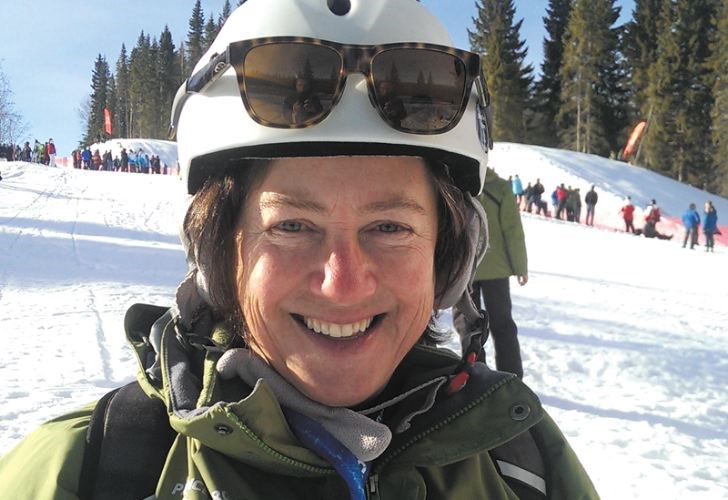As one of the pioneers of freestyle skiing in Canada, Meredith Gardner has seen radical changes in her sport the past four decades.
That evolution continued last month at the Canada Winter Games, where Gardner served as sport information officer for freestyle skiing and had a front-row seat in the spotter's booth to watch the best young athletes in the country in action on the slopes of Tabor Mountain.
"It's amazing - with the new disciplines like slopestyle and all the grabs, a lot of that freedom and spirit has really come back into the sport," said Gardner, sport development director for the Canadian Freestyle Ski Association. "I hate to say it, but with moguls and aerials it was almost getting too serious. We were losing some of the 'free' in freestyle and it's coming back with a vengeance. It's bringing back the creativity."
The Sochi Games in 2014 brought halfpipe and slopestyle (skiing and snowboarding) to the mainstream as Olympic medal sports and Canadians grabbed the medal spotlight in those new events. Dara Howell and Kim Lamarre captured gold and bronze in slopestyle skiing, Mike Riddle claimed silver in ski halfpipe and Mark McMorris won bronze in snowboard slopestyle.
Canada won four of the 10 freestyle skiing events at Sochi - women's slopestyle, women's ski cross (Marielle Thompson), women's moguls (Justine Dufour Lapointe) and men's moguls (Alex Bilodeau) and three other Canadians won Olympic silver in 2014 - Mikael Kingsbury (men's moguls), Chlo Dufour-Lapointe (women's moguls) and Kelsey Serwa (women's ski cross).
The country's continued success internationally in freestyle skiing and snowboarding at the Olympics, X Games and World Cup circuit has increased federal funding for the national teams and encouraged a new wave of athletes to pursue provincial and national team spots. Many of the country's up-and-coming stars and future Olympians competed at the Canada Games, which showcased the talents of homegrown snowboard cross champions Meryeta O'Dine and Evan Bichon at Purden Mountain Ski Resort and ski slopestyle/big air gold medalists Elena Gaskell of Vernon and Teal Harle of Whistler, who won at Tabor.
"The opportunity to get both halfpipe and slopestyle skiing in at Sochi and Dara Howell's gold medal and Mike Riddle's silver medal - those are just game-changers for us," said Gardner. "We are really lucky to end up at the top of that pile for national teams, it's so dependent on medals."
Gardner was a two-time bronze medalist at the world championships in 1986 and 1989 and won several national titles in aerials. If not for an injury she would have been on the Canadian team at the Winter Olympics in Calgary in 1988 when freestyle was introduced as a demonstration sport.
Her freestyle career began when she was an 11-year-old in 1972 at Blue Mountain, Ont., near Toronto, where she was blown away by the tricks Wayne Wong was pulling off in moguls, ballet and aerials.
"We actually had a course where you did moguls, ballet and jumping all in one run," she said.
In Prince George, the grassroots of sport are being nurtured by the Northern B.C. Freestyle Club, now in its fourth season. The club has steadily grown from 11 athletes in 2010-11 to its current 38.
The club still has a long way to go to rekindle the popularity of freestyle in the '80s and '90s, when the Central Interior Freestyle Club was producing national team moguls skiers Scott Bellavance, Chris Wong, Jennifer Simm and Garrett Simm and aerials specialists Brad Suey, Tron Rouleau , Lance Rouleau, Amy St. Amand and Jay Nachbaur. But there's no doubt the sport has been given a significant boost as a result of hosting the Canada Winter Games.
"As far as a legacy goes, the (federal) government has really helped our coaching progress by helping us fund coaching courses so we can get more coaches on the hill to help more athletes, and that's what's helping us grow," said James Hudson, head coach and president of the Northern B.C. Freestyle Club. "The more coaches we have and the better quality coaches we have, the better athletes we'll be able to produce. You have to be specially trained to teach these guys."
Whitehorse hosted the 2007 Canada Winter Games, which led to the formation of the Yukon Freestyle Ski Association a year later. With Games legacy money the territory invested in training facilities at Mount Sima Ski Hill in Whitehorse, and Yukon athletes made their presence felt in Prince George at the Games. Kyran Allen and Nico Rodden qualified for finals in the men's big air event with Allen finishing just off the podium in fourth, while Rodden was seventh overall in ski slopestyle.
"Hosting the Canada Games created interest in the sport and provided so much excitement about it," said Lynda Harlow, president of the Yukon Freestyle Ski Association. "We don't have a water ramp but we're building a summer ramp with a dry slope so we can actually use the air bag in the summer (to cushion the landing area for slopestyle and big air practices).
"There are lots of benefits to having the Games up there and I think the government sees the benefit for our kids and how good it is for the community when you have kids excited about a sport. You see the future of the sport and it's exciting."



